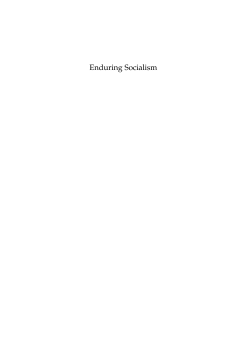
Additional Information
Book Details
Abstract
Against the historical backdrop of successive socialist and post-socialist claims to have completely remade society, the contributors to this volume explore the complex and often paradoxical continuities between diverse post-socialist presents and their corresponding socialist and pre-socialist pasts. The chapters focus on ways in which: pre-socialist economic, political, and cultural forms in fact endured an era of socialism and have found new life in the post-socialist present, notwithstanding revolutionary socialist claims; continuities with a pre-socialist past have been produced within the historical imaginary of post-socialism; and socialist economic, political, and cultural forms have in fact endured in a purportedly postsocialist era, despite the claims of neo-liberal reformers.
Harry G. West is Reader in Social Anthropology at the School of Oriental and African Studies (SOAS). His research in northern Mozambique has examined how colonialism, revolutionary socialism, and post-socialist political and economic liberalization have reconfigured institutions of local authority.
Parvathi Raman is a Lecturer in Social Anthropology at the School of Oriental and African Studies (SOAS). Her research in South Africa explores the historical impact of Indians in the South African Communist Party, and their contribution to the struggle against apartheid.
“…provides an important counterpoint to prevailing claims that socialism, in all its modes and meanings, was quickly abandoned by populations that were hungry to embrace the ‘freedoms’ of a market-oriented economy…reveals its ambitious scope and its broad, comparative approach toward understanding the complex anxieties and uncertainties that people continue to face in transforming societies.” · Journal of Anthropological Research
Table of Contents
| Section Title | Page | Action | Price |
|---|---|---|---|
| Title page-Enduring Socialism | i | ||
| Contents | v | ||
| List of Contributors | vii | ||
| Introduction | 1 | ||
| Ch 1-From socialist chiefs to postsocialist cadres | 29 | ||
| Ch 2-'For eating, it's guangzhou' | 44 | ||
| Ch 3-Searching for the time of beautiful madness | 77 | ||
| Ch 4-The object of morality | 103 | ||
| Ch 5-Vietnamese narratives of tradition, exchange and friendship in the worlds of the global socialist ecumene | 125 | ||
| Ch 6-Waste under socialism and after | 148 | ||
| Ch 7-Corruption and the one-party state in Tanzania | 169 | ||
| Ch 8-Media and the limits of cynicism in postsocialist China | 190 | ||
| Ch 9-The rooted anthropologies of east-central Europe | 214 | ||
| Ch 10-Historical analogies and the commune | 231 | ||
| Ch 11-Signifying something | 250 | ||
| Index | 271 |
